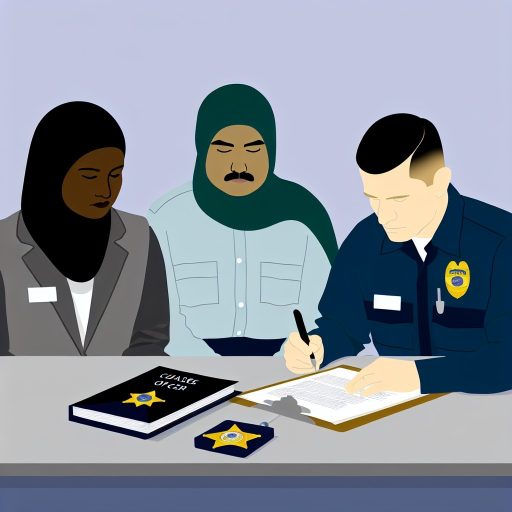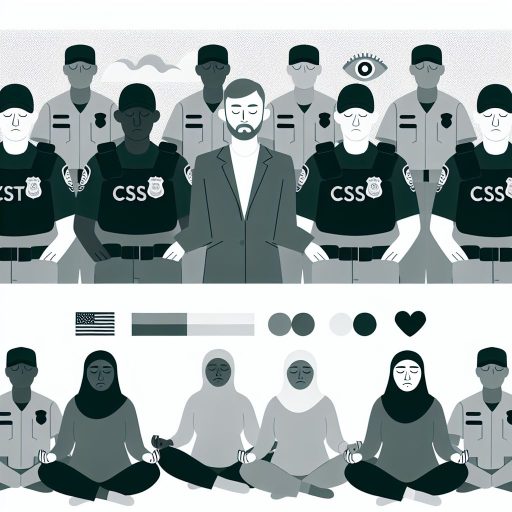Introduction:
A counterterrorism specialist plays a crucial role in safeguarding national security.
They identify and prevent potential threats.
It is essential to outline the key responsibilities of a counterterrorism specialist.
This ensures effective management of security risks.
Intelligence Gathering
Counterterrorism specialists collect intelligence.
They analyze the information carefully before dissemination.
These steps help identify potential threats and vulnerabilities.
Threat Assessment
Specialists assess the credibility of threats.
They also evaluate the severity of these threats.
This process prioritizes response actions.
Resources are allocated effectively based on these assessments.
Strategy Development
They develop comprehensive strategies to counter terrorism activities.
Strategies include preventive measures and response protocols.
Coordination and Collaboration
Counterterrorism specialists work closely with law enforcement agencies.
They also collaborate with intelligence services and international partners.
This cooperation enhances information sharing and response capabilities.
Risk Mitigation
They implement measures to reduce security risks.
Steps include securing critical infrastructure and conducting threat assessments.
Training and Education
Specialists provide training to security personnel.
Transform Your Career Today
Unlock a personalized career strategy that drives real results. Get tailored advice and a roadmap designed just for you.
Start NowThey also educate the public on identifying terrorist threats.
The training covers how to respond effectively to such threats.
Crisis Management
Counterterrorism experts lead crisis response efforts during attacks.
They coordinate with stakeholders to manage the situation.
Resource management is handled efficiently under their guidance.
Technology and Innovation in Counterterrorism
Specialists utilize advanced technology to improve security operations.
Innovative solutions enhance surveillance and threat detection.
These technologies also improve response capabilities.
The key responsibilities of a counterterrorism specialist are integral to national security.
These duties help protect the public from terrorist threats effectively.
Gathering Intelligence
- Conducting research and analysis on terrorist activities.
- Monitoring online communication and social media platforms.
- Collaborating with intelligence agencies to gather relevant information.
- Using technological tools to track potential threats.
As a counterterrorism specialist, one key responsibility is gathering intelligence to stay ahead of threats.
This involves conducting thorough research and analysis on terrorist activities to understand their tactics and strategies.
It is essential to monitor online communication and social media platforms where extremists may communicate and recruit new members.
By tracking these channels, specialists can identify patterns and trends that may indicate a looming threat.
Collaboration with intelligence agencies is crucial in gathering relevant information.
By sharing insights and data, specialists can build a comprehensive picture of threats and work together to prevent attacks.
Technological tools play a significant role in tracking potential threats.
Specialists use advanced software and systems to monitor suspicious activities, analyze data, and identify individuals or groups that pose a risk to security.
Gathering intelligence is a multifaceted process that requires research, monitoring, collaboration, and technological expertise.
By staying vigilant and proactive in intelligence gathering, specialists can effectively thwart terrorist threats before they materialize.
Transform Your Career Today
Unlock a personalized career strategy that drives real results. Get tailored advice and a roadmap designed just for you.
Start NowKey Responsibilities of Threat Assessment in Counterterrorism
One of the key responsibilities of a counterterrorism specialist is assessing threats.
This process involves evaluating the credibility and urgency of potential threats.
Specialists also identify patterns and trends in terrorist activities.
They analyze the level of risk associated with specific threats.
Furthermore, they utilize risk assessment techniques to prioritize threat response.
- Evaluating the credibility and urgency of potential threats.
- Identifying patterns and trends in terrorist activities.
- Analyzing the level of risk associated with specific threats.
- Utilizing risk assessment techniques to prioritize threat response.
Assessing threats is a critical aspect of counterterrorism efforts.
It helps in understanding the nature and potential impact of various threats.
By evaluating the credibility and urgency of potential threats, specialists determine the needed level of attention.
They also decide on the resources that must be allocated to address the threats.
Identifying patterns and trends in terrorist activities is essential for prediction and prevention.
By studying past incidents and recognizing commonalities, specialists anticipate potential threats effectively.
This allows them to take proactive measures to mitigate risks.
Analyzing the risk level linked with specific threats enables specialists to assess potential consequences.
They evaluate the likelihood of an attack and prioritize response efforts accordingly.
This information helps allocate resources in an effective manner.
Utilizing structured risk assessment techniques enables systematic evaluation and ranking of threats.
Specialists use methodologies such as threat matrix models and scenario analysis.
These tools help determine the most critical threats requiring immediate attention.
Threat assessment is a multifaceted process needing comprehensive understanding.
It involves knowledge of terrorist activities, risk management principles, and analytical tools.
Transform Your Career Today
Unlock a personalized career strategy that drives real results. Get tailored advice and a roadmap designed just for you.
Start NowBy carefully evaluating, identifying, analyzing, and prioritizing threats, specialists enhance security measures.
Their efforts effectively combat terrorism and improve safety.
Find Out More: DEA Agent Code of Conduct and Ethics
Developing Strategies
Formulating counterterrorism strategies requires current intelligence and threat assessment.
These strategies help prevent threats and improve security efforts.
Implementing preventive measures deters potential terrorist attacks.
Collaboration with law enforcement agencies improves coordination of response efforts.
Creating contingency plans prepares for various threat scenarios effectively.
- Formulating counterterrorism strategies based on intelligence and threat assessment.
- Implementing preventive measures to deter terrorist attacks.
- Collaborating with law enforcement agencies to coordinate response efforts.
- Creating contingency plans for various threat scenarios.
See Related Content: School Resource Officers: Myths vs. Facts
Training and Education
- Providing training to law enforcement personnel on counterterrorism tactics
- Conducting workshops and seminars on identifying suspicious behaviors
- Educating the public on ways to report suspicious activities
- Keeping up-to-date on the latest trends and tactics employed by terrorists
Counterterrorism specialists play a crucial role in ensuring the safety and security of communities.
They provide training and education to various groups.
Training Law Enforcement Personnel
One key responsibility of a counterterrorism specialist is providing training to law enforcement personnel.
This training focuses on the latest counterterrorism tactics.
Training ensures that law enforcement agencies respond effectively to potential threats and attacks.
Conducting Workshops and Seminars
Counterterrorism specialists also conduct workshops and seminars.
These sessions help identify suspicious behaviors that may indicate a terrorist threat.
By educating individuals on what to watch for, specialists empower communities to act proactively.
Educating the Public
Another important aspect is educating the public on reporting suspicious activities.
Specialists provide information on how to report suspicious behavior effectively.
This enables communities to participate actively in preventing terrorism.
Transform Your Career Today
Unlock a personalized career strategy that drives real results. Get tailored advice and a roadmap designed just for you.
Start NowKeeping Up-to-Date with Emerging Threats
Staying informed about the latest trends and tactics used by terrorists is essential.
By keeping current on evolving threats, specialists adapt their strategies effectively.
This helps counter terrorist activities more successfully and maintain security.
Training and education form fundamental parts of a counterterrorism specialist’s role.
Specialists enhance security and prevent terrorist attacks through their efforts.
Uncover the Details: Training Requirements for Campus Security Officers
Crisis Response
- Coordinating response efforts in the event of a terrorist attack
- Implementing emergency protocols to ensure public safety
- Communicating with media and public officials during crisis situations
- Assisting with rescue and recovery operations as needed
During a crisis, a counterterrorism specialist plays a crucial role in coordinating response efforts.
This includes working with various agencies and organizations to ensure a swift and effective response to the terrorist attack.
Emergency protocols must be implemented promptly to protect the public from further harm.
This may involve lockdown procedures, evacuation plans, and other measures to secure the area and mitigate risks.
Effective communication with the media and public officials is essential during crisis situations.
The specialist must provide accurate information to the public to prevent panic and help individuals stay safe.
In some cases, the specialist may also be involved in rescue and recovery operations.
This could include working with first responders to locate and assist victims of the attack, as well as helping to secure the area for investigation.
Crisis response is a key responsibility of a counterterrorism specialist.
This requires quick thinking, effective communication, and the ability to work under pressure to ensure public safety.
Uncover the Details: Common Challenges Faced by TSA Officers on Duty

International Collaboration
- Working with foreign intelligence agencies to share information on global threats.
- Participating in international counterterrorism task forces and initiatives.
- Collaborating with Interpol and other international organizations to track terrorist activities.
- Building relationships with counterparts in other countries to strengthen global security.
International collaboration is a crucial aspect of a counterterrorism specialist’s role.
By working with foreign intelligence agencies, specialists can share critical information on global threats.
This collaboration enables a more comprehensive understanding of the global terror landscape.
Transform Your Career Today
Unlock a personalized career strategy that drives real results. Get tailored advice and a roadmap designed just for you.
Start NowIt also facilitates coordinated efforts to combat terrorism effectively.
Participating in international counterterrorism task forces and initiatives enhances a specialist’s ability.
These task forces bring together experts from different countries to develop strategies.
They implement actions to disrupt terrorist networks and prevent attacks.
Counterterrorism specialists also collaborate with international organizations like Interpol.
Interpol plays a vital role in coordinating global law enforcement efforts.
It shares intelligence to track terrorist activities across borders.
Building relationships with counterparts in other countries strengthens global security.
By fostering strong partnerships with international colleagues, specialists exchange best practices.
They leverage resources and enhance cooperation to prevent and counter terrorist threats.
Engaging with foreign partners and participating in global initiatives helps specialists combat terrorism globally.
Protecting Critical Infrastructure
Counterterrorism specialists play a crucial role in safeguarding key infrastructure targets.
These targets face risks from potential terrorist attacks.
This responsibility involves various tasks.
- Identifying key infrastructure targets at risk of terrorist attacks: Counterterrorism specialists must assess potential threats to critical infrastructure such as transportation systems, energy facilities, and communication networks.
- Implementing security measures to protect critical infrastructure: Once vulnerabilities are identified, specialists must develop and implement robust security protocols to mitigate risks and prevent attacks.
- Conducting security assessments and audits to identify vulnerabilities: Regular evaluations of security systems and infrastructure are necessary to identify weaknesses and address them proactively.
- Coordinating with government agencies and private sector partners: Collaboration with various stakeholders is essential to enhance protection measures for critical infrastructure. This includes sharing intelligence, resources, and best practices.
Protecting critical infrastructure remains a top priority for counterterrorism specialists.
These targets are often attractive to terrorist groups seeking maximum impact and disruption.
Key Responsibilities of a Counterterrorism Specialist
As a counterterrorism specialist, it is imperative to gather intelligence on potential threats.
Conducting thorough analysis of data helps identify terrorist networks effectively.
Developing strategies to mitigate risks and respond to terrorist activities is a primary duty.
Collaboration with law enforcement agencies enhances efforts to combat terrorism.
Transform Your Career Today
Unlock a personalized career strategy that drives real results. Get tailored advice and a roadmap designed just for you.
Start NowWorking with international partners further increases effectiveness in these operations.
Implementing security measures protects vulnerable targets from potential attacks.
Participating in training programs ensures specialists stay current on terrorist tactics.
Using advanced technology supports tracking and monitoring of terrorist movements.
Engaging with communities builds trust and helps gather critical information.
Assessing threats and vulnerabilities provides recommendations to enhance national security.
Remaining vigilant and ready to respond swiftly is critical in crisis situations.
Impact of Counterterrorism Specialists on National Security
The responsibilities of counterterrorism specialists are crucial for safeguarding national security.
Effective counterterrorism efforts prevent violent acts and save lives.
The ongoing need for skilled professionals in this field highlights the importance of their work.
Additional Resources
1 FAM 260 BUREAU OF DIPLOMATIC SECURITY (DS)
Homeland Security Careers | Homeland Security
[E-Books for Sale]
The Big Book of 500 High-Paying Jobs in America: Unlock Your Earning Potential
$19.99 • 500 High-Paying Jobs • 330 pages
Explore 500 high-paying jobs in America and learn how to boost your career, earn more, and achieve success!
See All 500 High-Paying Jobs of this E-Book
1001 Professions Without a Degree: High-Paying American Jobs You Can Start Now
$19.99 • 1001 Professions Without a Degree • 174 pages
Discover 1001 high-paying jobs without a degree! Unlock career tips, skills, and success strategies for just $19.99!




